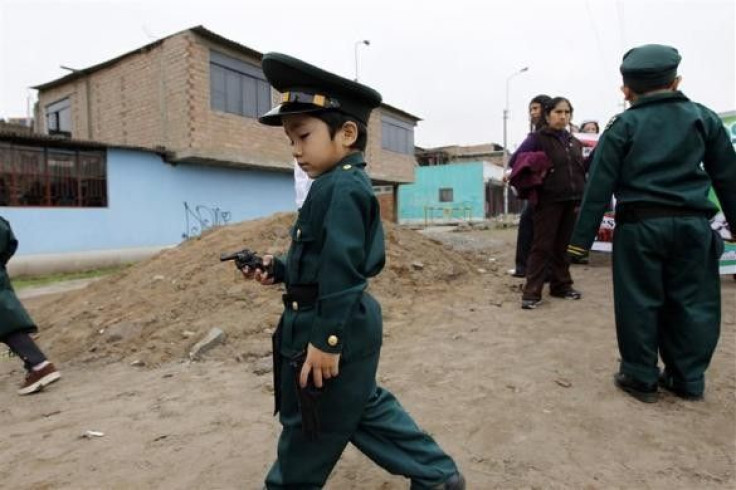Tamir Rice Shooting Update: 12-Year-Old's Death Renews Debate Over Whether Toy Gun Sales Should Be Illegal

The weapon stashed in Tamir Rice's waistband last Saturday was an airsoft rifle, but the police didn't know that. So when a Cleveland police officer saw him reach for the gun, he opened fire, fatally shooting the 12-year-old and reopening a nationwide, decades-old debate over whether toy guns should be banned.
The issue isn't what they do, it's how they look. Plastic, pellet and BB guns are often designed to look like pistols, rifles and handguns, so mistaken-identity cases are becoming common in the U.S. Some people think the best way to prevent such tragedies is to prohibit their sale.
"There's too many of these realistic-looking weapons on toy shelves," said James Swartz, director of World Against Toys Causing Harm Inc., a nonprofit based in Boston. When police have to make a split-second decision based on a glance at such a device, they'll shoot if it resembles an actual gun. The federal law that requires toy guns to be sold with bright orange tips is inadequate, Swartz said, because the tips can be covered up and removed.
That realistic appearance of toy guns can combine with kids' innocence in a dangerous way. They simply don't understand how threatening they look when they're holding replica weapons, said child psychologist Dr. Michael Thompson of Arlington, Mass. "They don't see it through adult eyes," he said. "They're playing."
In 2013, California police fatally shot 13-year-old Andy Lopez, who was walking around his neighborhood with a replica AK-47. Earlier that year, officers fired at 16-year-old Victor Villalpando in New Mexico when he pointed a cap gun at them. In 2012, 15-year-old Jaime Gonzalez Jr. died after aiming his BB gun at Texas police.
But toy guns don't make children violent, according to the Toy Industry Association, based in New York. Instead, "military and other role-play items may help kids work through or cope with what is happening in the world around them," the trade group said in a statement. Thompson said that playing with toy guns makes kids -- especially boys -- feel strong and heroic. "Little boys are going to do anything that amplifies their power," he said.
While toy guns remain available to kids, some states are taking action to prevent lethal confusion. California lawmakers passed a bill this year that mandates all toy guns have brightly colored surfaces or have fluorescent strips, the Associated Press reported. State Rep. Alicia Reece planned to introduce a similar proposal in Ohio by Dec. 10, the Dayton Daily News reported.
Cleveland Police Chief Calvin Williams said in a press conference earlier this week that he supported Reece's proposal. He also indicated he was behind the idea of a complete ban on replica weapons. "We shouldn't supply guns of any makeup to our kids -- whether they're toys or not," Williams said.
The Cleveland police got a 911 call Saturday about a person at a park pointing a gun at people. The caller twice told the dispatcher the gun was "probably fake," but the officers sent to investigate were not told that, Cleveland.com reported. When they arrived, Tamir grabbed his gun from a table and put it in his waistband. The two officers told him to raise his hands, but Tamir reached for the weapon, at which point rookie officer Timothy Loehmann shot him. Loehmann was placed on administrative leave pending a full investigation into the incident.
Steve Presser, who owns Big Fun Toy Store in Cleveland, said he planned to comply with any orders that would have him stop selling toy guns. "If legislation came down and said, 'Absolutely, positively, you need to withdraw all your guns,' I would do it in a heartbeat," he said. But Presser said he thinks children should be able to play.
Thompson said the burden shouldn't be on toy stores to forbid gun sales, it should be on parents to educate their children. "I don't think you take the toys away," he said. "It's adults that have to explain to 12-year-olds, 'You could be seen by a policeman as seeing a real gun.'"
© Copyright IBTimes 2024. All rights reserved.












